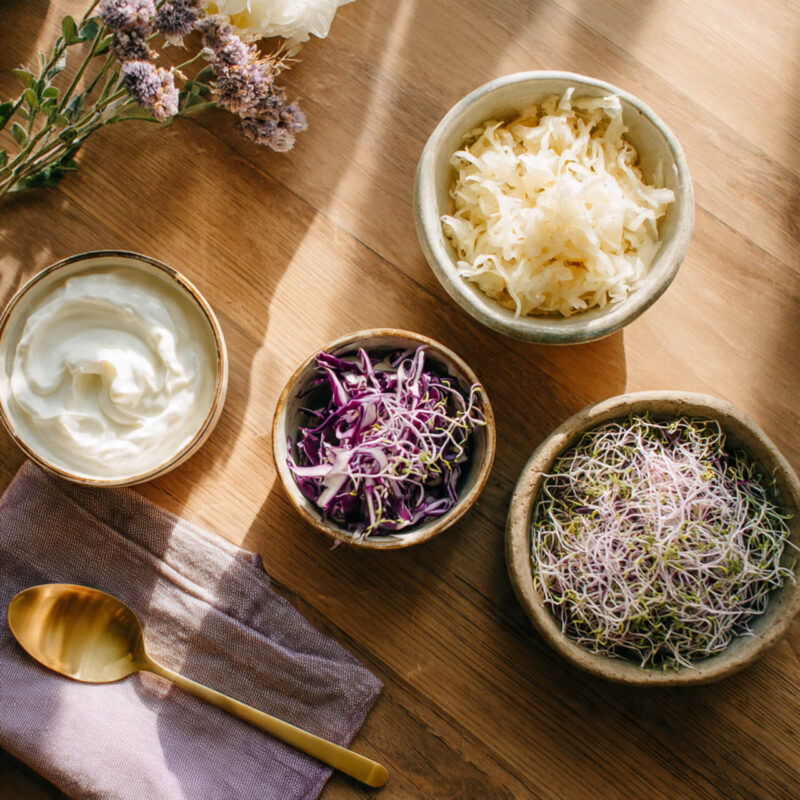Read time: 12 minutes
Quick Summary: Struggling with low energy, brain fog, or constant stomach discomfort? This guide shows how one small probiotic habit can transform your gut health, and your self-trust in 30 days, with insights, and simple reflective steps.
When your gut health is off, everything just feels harder. You’re tired by 2pm every day, no matter how much tea or coffee you drink. Your stomach feels off more often than it feels good and your mood swings seem so random, anxious one hour, irritable the next and for no clear reason.
You catch every cold that goes around, and it takes forever for you to bounce back.
Here’s what most people don’t realize: these aren’t separate problems. They’re often connected to one system in your body that’s probably not getting what it needs and that’s your gut microbiome.
You’ve probably heard about this. You know fermented foods and probiotics are supposed to help and you may have even bought the sauerkraut or the kombucha or the fancy yogurt.
And maybe it’s sitting in your fridge right now. Untouched. Slowly expiring while you reach for something that actually tastes good.
I used to tell myself I’d start eating better on Monday… and then somehow Monday came and it was always next Monday. It took me a long time to realise it wasn’t laziness, it was just habit and comfort doing what they always do.
Here’s the thing most advice about gut health sounds simple, but living it is another story.
Disclaimer: I’m not a doctor or nutritionist I’m just someone who struggled with low energy and brain fog, tried adding probiotic foods, and saw real improvements. Everyone’s body responds differently. If you have health conditions or take medication, consult a healthcare provider before making changes.

Contents
- Quick Answer: Best Probiotic Foods for Gut Health (Beginner-Friendly)
- The Real Problem Isn't What You Think
- Why Your Gut Health Actually Matters
- How to Retrain Your Palate for Gut Health
- Your Action Plan: Building the Habit That Heals Gut Health
- Easy gut health Probiotic Foods for Beginners
- 3 Actions You Can Take Today for your gut health
- Everyday Mastery Steps You Can Take Now
Quick Answer: Best Probiotic Foods for Gut Health (Beginner-Friendly)
Start with ONE probiotic food, 3× per week for 30 days: Greek yogurt, sauerkraut, or kefir. Most people who respond well notice steadier energy and easier digestion within 2–4 weeks (timelines vary). If symptoms worsen beyond 2–3 weeks, switch foods or seek professional guidance.
But here’s what that simple advice doesn’t tell you and why most people abandon it within a week.
The Real Problem Isn’t What You Think
Most gut health advice tells you what to eat, but not how to stick with it when everything in your biology is fighting against you.
We’ve trained ourselves to crave what’s been engineered to taste good, not what’s good for us. Food scientists have spent billions perfecting the mix of sugar, salt, and fat that hijacks your reward system.
And now, a bowl of plain Greek yogurt feels disappointing next to a candy bar.
Of course it does. But food can be both nourishing and enjoyable i mean not in the crash-inducing, hyper-palatable way, but in a deeper way that leaves you energized and clear-headed.
The funny thing is, the real problem isn’t discipline. It’s that you’ve never learned to train your preferences to align with what your body actually needs. But you can. You can reshape your palate through patient, consistent practice, what I call probiotic habit formation.
Most of us aren’t short on information, we’re surrounded by it. The challenge is actually changing what we reach for. If you’ve ever wondered why ultra-processed foods are so hard to quit, I explored that in Ultra-Processed Foods: Simple Changes That Actually Work.
But before we talk about how to retrain your taste buds, let’s get clear on why this matters enough to push through the initial discomfort.
Why Your Gut Health Actually Matters
Your gut isn’t just about digestion, it’s your body’s control centre for how you feel, think, and show up each day.
When your gut bacteria are balanced and fed well, everything works better:
- You have steadier energy instead of that 2pm crash.
- Your mood feels calmer and more stable.
- Your focus sharpens and brain fog starts to fade.
- You get sick less often and recover faster.
When they’re out of balance, your body struggles to absorb nutrients and regulate inflammation which can leave you feeling tired, bloated, or just “off” for no clear reason.
As Professor Tim Spector, genetic epidemiologist at King’s College London and founder of ZOE Health, explains:
“The diversity of your gut microbiome is one of the best predictors of long-term health outcomes.”
His research shows that eating a wide range of real, fibre-rich foods, especially fermented ones helps those beneficial bacteria thrive. In simple terms: the more variety you feed your gut, the more balanced, energised, and resilient you feel overall.
On the other hand, research from neuroscience points to the same conclusion from a different angle. Neuroscientist Dr Andrew Huberman also shares this view in his Gut Microbiome Health newsletter, explaining that supporting your microbiome through fermented foods, adequate sleep, and regular movement directly improves energy, mood, and immune strength.
So if gut health affects everything from energy to immunity, the next question becomes obvious: how do you actually make yourself eat foods that support it, especially when they don’t taste that good yet?
Midway pause: If you’re enjoying this, you’ll love the Everyday Mastery newsletter friendly insights for habits that actually last.

How to Retrain Your Palate for Gut Health
Here’s where most gut health advice falls apart, it assumes willpower is enough. It’s not.
Your taste preferences aren’t fixed, they’re trained. If they’ve been trained to crave engineered foods, they can be retrained to crave nourishing ones.
Not through willpower, but through small, consistent exposure. This process, sometimes called taste adaptation, is how your palate gradually adjusts to new flavours and supports your gut health long term.
About a year ago, I bought my first jar of sauerkraut. Here’s the funny thing, I didn’t expect it to change anything, I actually hated it, the smell, the texture that sour bite that felt wrong. But I kept showing up because it was important.
So i tried it with different foods and discovered pairing it with pickles especially Gherkins which i love made it taste more palatable to me. I added it to meals instead of eating it alone. Within three weeks, my energy stabilised and my digestion improved. Eventually, the taste shifted, I’m not sure when I just enjoy it now maybe my body started recognising it as fuel.
Now I eat sauerkraut, yogurt, kefir, and microgreens regularly. I mean none of these thrilled me at first, and they don’t really hit like a pack of pringles but they changed how I feel. Talking of pringles, those things keep me munching more and more and yet i dot keep going to the fridge for more Kraut ! Funny that !.
The process I stumbled through took months of trial and error. Here’s the streamlined version, the exact system that would’ve saved me six months of false starts.
If you’re also trying to build healthier eating habits that don’t rely on discipline, you’ll love this guide on weight loss without willpower.
Your Action Plan: Building the Habit That Heals Gut Health
This framework is designed for people who’ve tried “healthy eating” before and given up. It works because it removes the pressure to enjoy anything initially, you’re just practising showing up.
1. Start Ridiculously Small
Pick one probiotic food anyone at all and eat it three times per week for 30 days. That’s it. Miss a week? Restart. No failure here ever ,just practice. Small steps like this are how you begin to improve your gut health without overwhelm and giving up very quickly.
2. Find Your Gateway Combination
Make it tolerable first, not delicious. Try combinations like:
- Sauerkraut with eggs and toast
- Greek yogurt with berries and honey
- Kimchi in a rice bowl
- Kefir blended into a smoothie
These simple probiotic food pairing ideas make the habit easier to sustain and support consistent gut health progress.
3. Commit to Showing Up, Not Enjoying
You’re committing to trying these foods, not necessarily liking them. After 10–12 tries if its not working, switch to something else. That’s part of overcoming the dislike of them and building comfort around gut health foods.
4. Set a Specific Trigger
Link it to an existing habit: “After coffee on Mon/Wed/Fri, I’ll eat yogurt,” or “With dinner Tue/Thu/Sat, I’ll add sauerkraut.” This is classic habit stacking which anchors a new action to an existing routine. Linking your new probiotic habit to an existing routine is one of the easiest ways to make it stick.
However it’s not just about what you eat , it’s also about how these choices affect your energy day after day. If you’re often tired and reaching for quick comfort foods then check out 7 Food Swaps for When You’re Tired All the Time — it’s a simple guide to nourishing energy without the crash.
5. Manage Initial Discomfort
If you get gas or bloating that can be normal maybe try smaller portions, take it with meals, and stay hydrated. If symptoms persist beyond 2-3 weeks, pause and reassess your gut health routine.
6. Track Progress
Note down daily: energy, digestion, mood, and cravings. Look for patterns after two weeks this consistency will help you see the benefits of daily probiotic foods clearly.
7. Notice Without Judging
Observe your body’s responses whether good or bad. Your taste may shift; that’s progress, not perfection.
8. Manage Expectations
Weeks 1–2: chore. Weeks 3–4: first improvements. Beyond Week 5: genuine preference shift.
Everyone’s timeline for better gut health is unique.
Now that you have the system, let’s talk about which foods make the best starting point, because not all probiotic foods are created equal for beginners in my opinion, but again we are all different this is just my suggestion.
And if you’ve ever wondered why eating changes feel so hard to maintain, here’s the real reason diets don’t stick and what to do instead.

Easy gut health Probiotic Foods for Beginners
Here’s how to choose based on your tolerance, budget, and dietary needs:
| Food | Best For | Difficulty | Dairy-Free? | FODMAP-Friendly? | Starter Tip |
|---|---|---|---|---|---|
| Greek yogurt | Beginners | Easy | No | Often | 2 tbsp after coffee |
| Sauerkraut | Budget, DIY | Easy | Yes | Moderate | 1 tbsp with eggs |
| Kefir | Gut diversity | Moderate | No | No | 100 ml smoothie |
| Kimchi | Savoury meals | Moderate | Yes | No | Start mild |
| Miso | Cooking base | Easy | Yes | Moderate | Don’t boil |
| Tempeh | High protein | Moderate | Yes | No | Marinate overnight |
| Kombucha | Soda swap | Easy | Yes | Varies | Choose low sugar |
Just to add here that Sauerkraut is one of the cheapest to make there’s lots of recipes online and its really easy to do.
At this point, you might be feeling that familiar resistance you know that voice that says this all sounds too simple, too earnest, too well healthy. Let’s address him directly before he takes over and stops you in your tracks

Mr Critic Moment
Really? We’re celebrating eating cabbage now?”
That dry little voice of doubt shows up for every new habit, although some people don’t hear it as a voice at all. They feel it as hesitation, tightness, or resistance in the body. However it shows up, the trick isn’t to silence it, it’s to smile, thank it for its concern, and still take that first bite.
So let’s make this concrete. Here’s exactly what to do in the next 24 hours.
3 Actions You Can Take Today for your gut health
- Add one forkful of sauerkraut to dinner tonight. No rules just try it, some people actually like it.
- Swap one sugary snack this week for a small pot of plain Greek yogurt.
- Note one positive change you feel in energy or digestion by the end of the week. Remember if no changes keep going.
Everyday Mastery Steps You Can Take Now
- Start with kindness: your palate isn’t broken, it’s just untrained.
- Keep the practice small and real: three times a week is enough.
- Reflect after each attempt but not on perfection, but on presence. You can even track your small daily wins with the Non-Negotiable Habit Tracker — it’s how I keep consistency visible when motivation dips.
The physical changes are just the surface, the real transformation happens when you start asking these questions:

Journaling Prompts:
What sensations or thoughts come up when you eat something that feels “healthy but not exciting”?
When has consistency felt easier than motivation?
How does your body feel when it’s nourished vs entertained?
The Bigger Win
In short, this isn’t just about sauerkraut or yogurt what its about is that proof that change is possible for you.
And maybe that’s the point, it’s never really about the food alone. Every forkful is evidence of change. That’s Everyday Mastery—the true gut health mindset shift.
If this post helped you, consider buying me a coffee — it keeps the kettle (and the ideas) warm. Or join the Everyday Mastery newsletter for calm, practical insights each week.
This is your permission slip to start messy. We don’t chase perfect here what we do is practise progress, because that’s Everyday Mastery.
Kel is the writer behind Everyday Mastery, where she shares the real, messy, and meaningful process of building habits, resilience, and self-belief from the ground up. Her writing blends ancient philosophy with modern science, always focused on small, practical steps that lead to lasting





